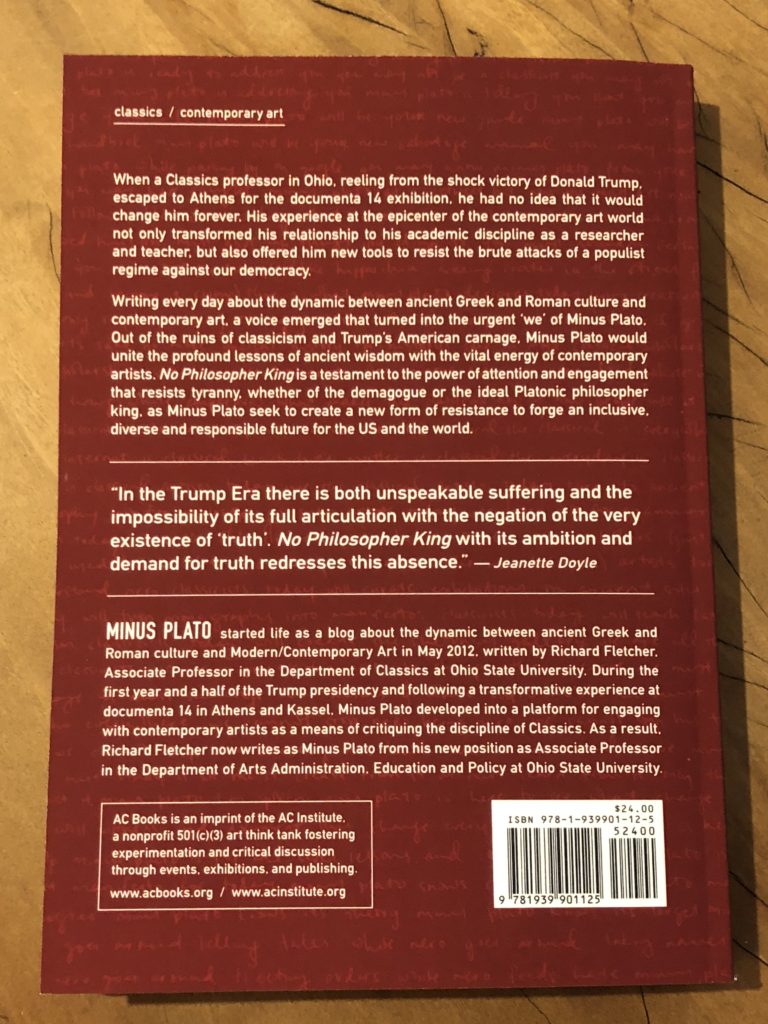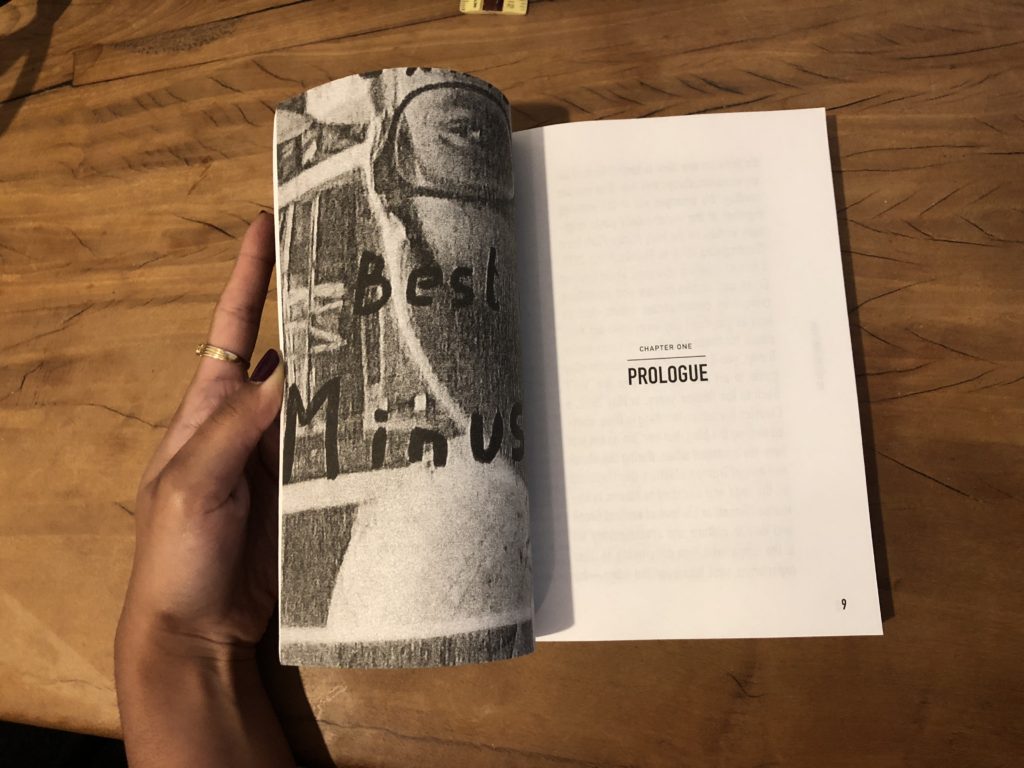It feels right that it would be here in a post on my blog Minus Plato that I would launch my new book No Philosopher King: An Everyday Guide to Art and Life under Trump (Published by AC Books and available now from Amazon, Barnes & Noble and the WexStore).
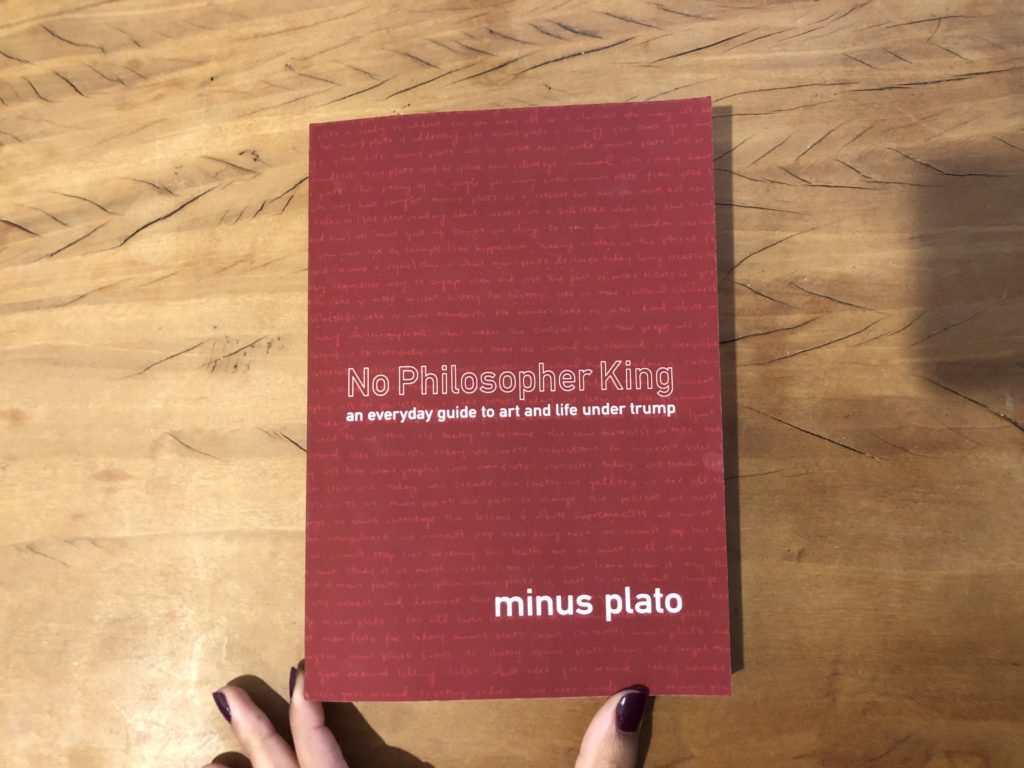
This is where it all began back in late November 2016, following the initial period of mourning after Trump’s election, when I decided that instead of railing against the devastating state of the world on social media, I would commit to writing daily blogposts that triangulated my work on the dynamic between Classics and Contemporary Art with modest acts of resistance against the Trump regime.
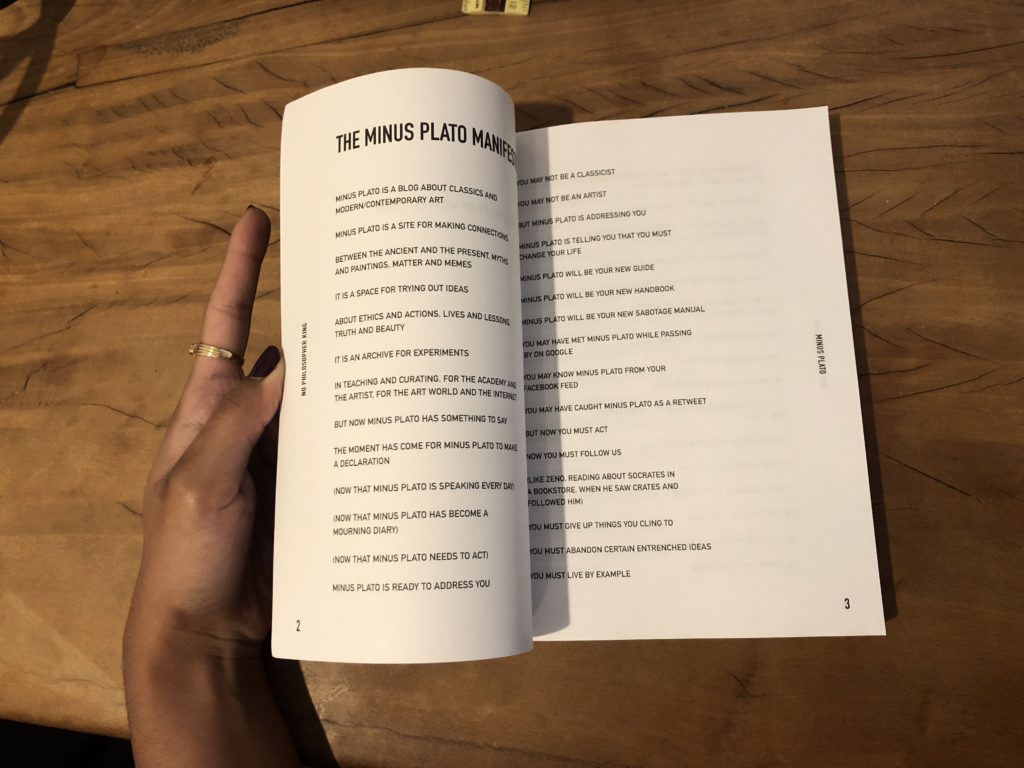
Perhaps there will be other launches in my future. I can almost picture them. There I am, standing at a podium in a bookstore or museum (or, ideally, a museum bookstore), surrounded by fresh copies of the book and hold forth before a rapt audience, maybe even reading this very text.
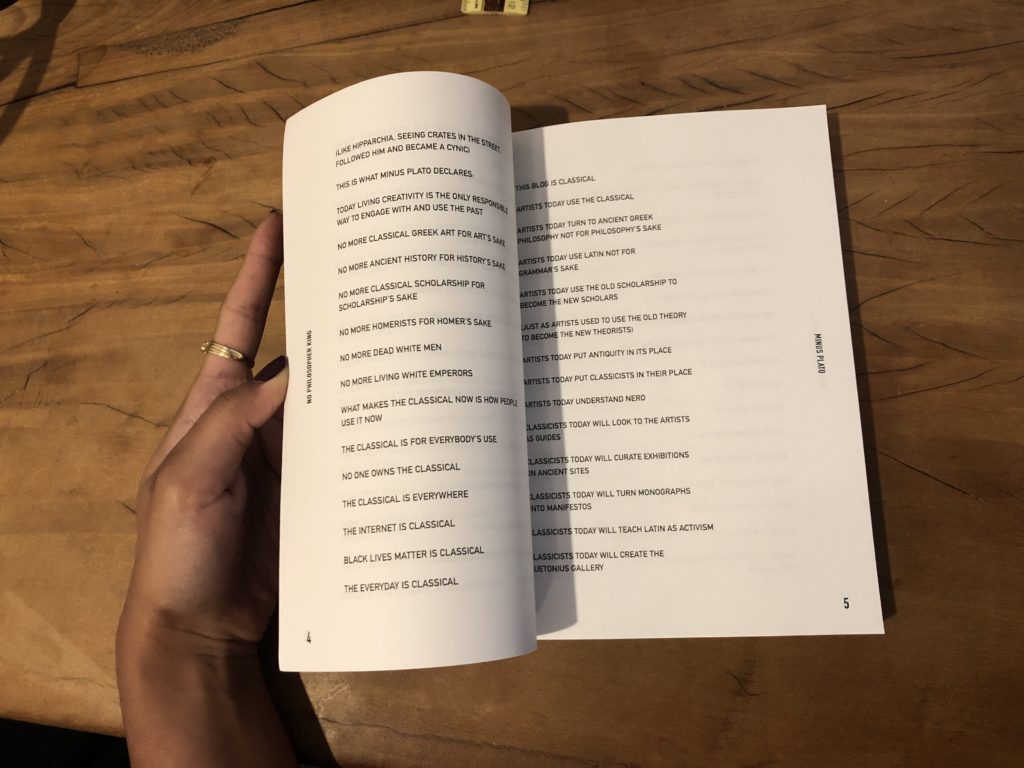
by mere images of the real thing, opened in the hands of its designer Raquel Alicia Hazell, whose handwritten version of ‘The Minus Plato Manifesto’ also graces the cover.
We muse further on the process of translating the blog to book within the book itself (See Ch. 5: ‘Medea/Media/Medya’), but it was not until I experienced the book in the flesh that I realized just how much this project demanded a direct and embodied form of engagement.
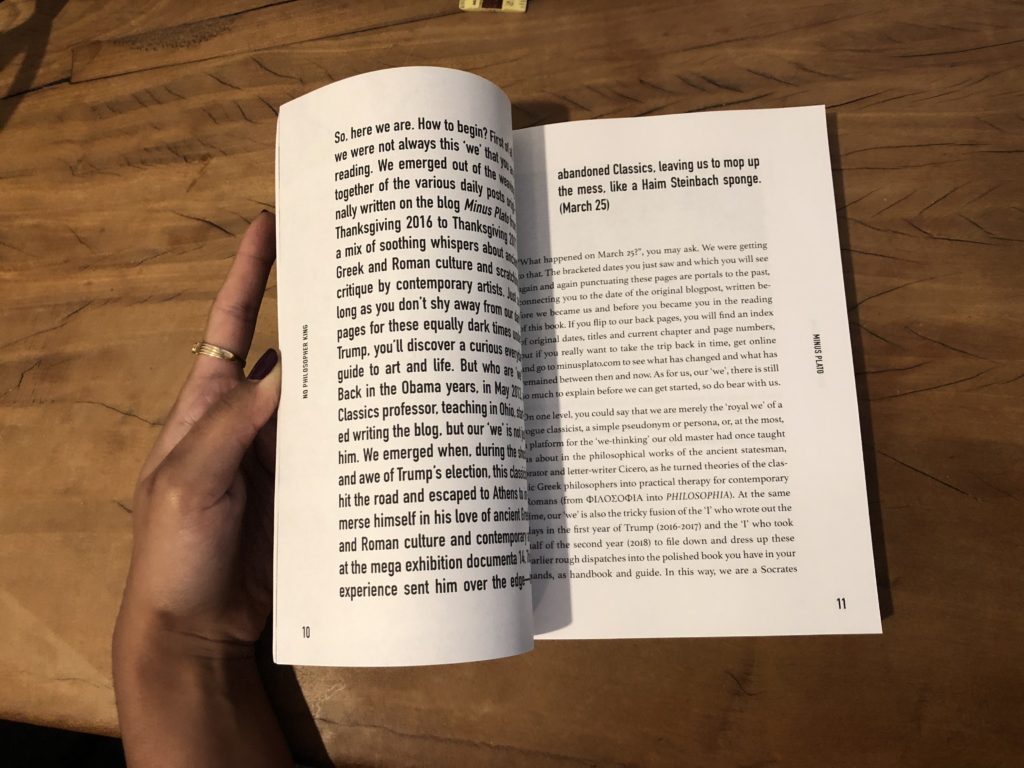
When my copies arrived from the publisher yesterday, I was struck by the book’s weight. It felt heavier in my hands than I had expected. It was a tome. At the same time, there was something precarious about this object, especially when compared with the durable and flexible nature of its former life as so many posts online. For example, I noticed how, after reading, traces of my touch would be left on its cover, leaving the temporary smudges of fingerprints behind. This feeling of heaviness and precariousness made me feel I had made a real handbook, written to be used, with both urgency and care.
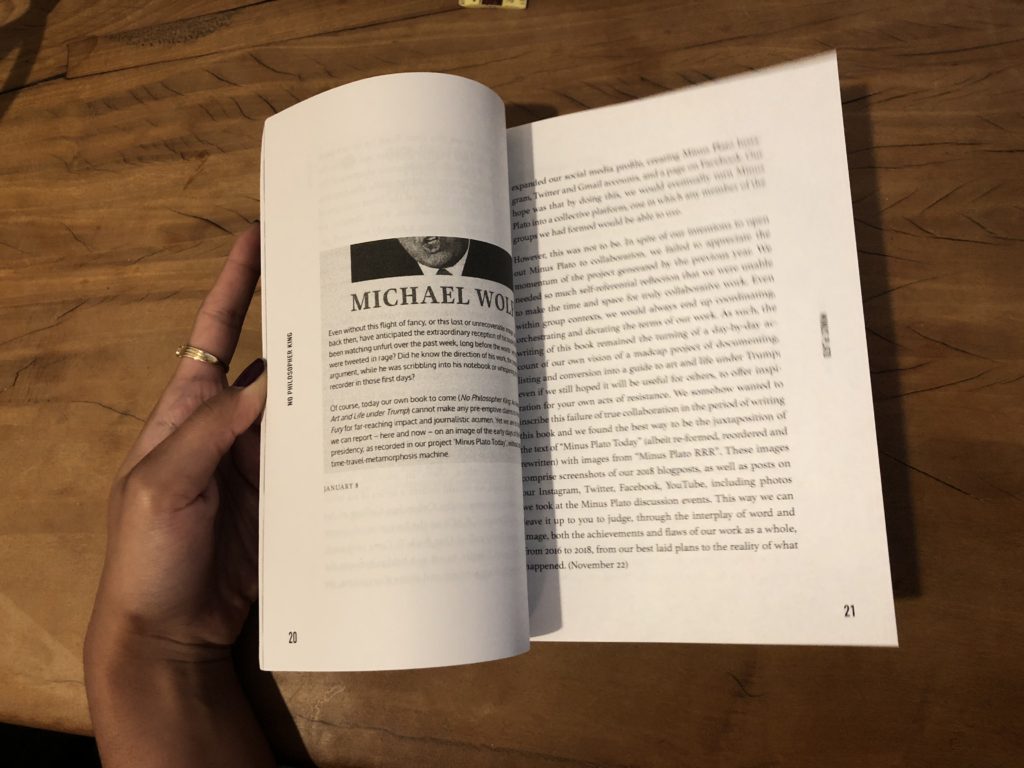
I want to spend the rest of this post to launch the book in an attempt to explain how the experience of the book’s heaviness and precariousness stems from my position in the middle of the ongoing process of resistance and decolonization within and between the academic world of Classics and the institutions of Contemporary Art in these dark years under Trump.
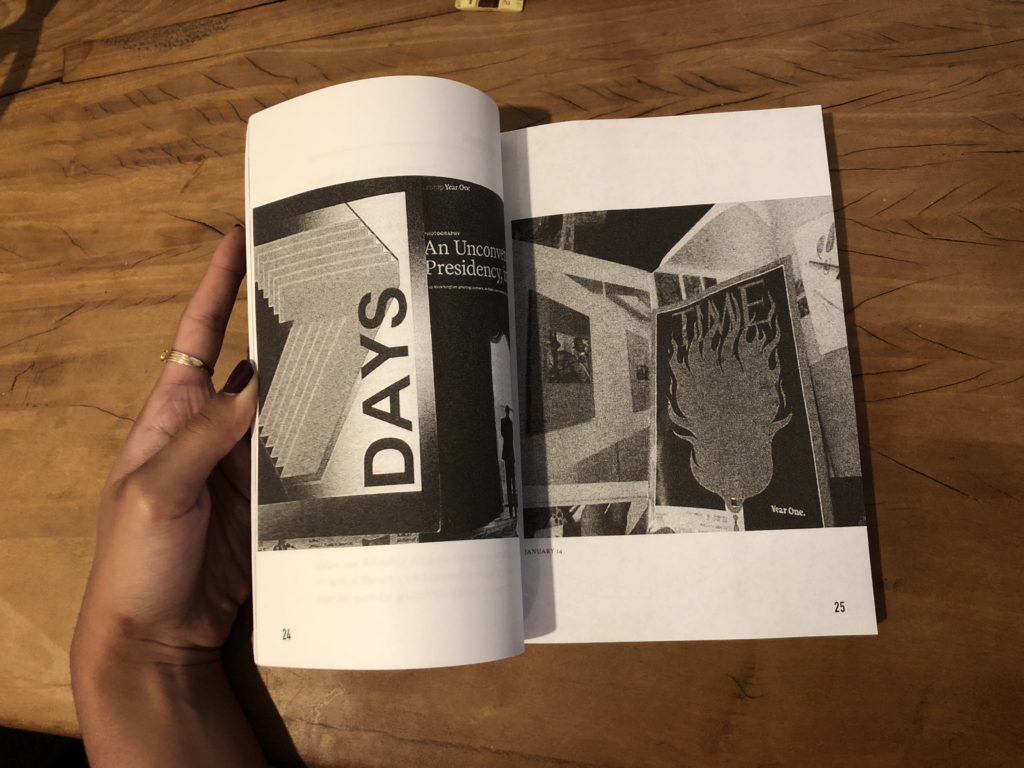
The book’s physical weight is a symbolic reminder of the density of the project contained within its covers: a year of daily posts (Nov. 2016-Nov.2017) rewritten into a narrative of eleven thematic chapters during the first half of 2018. It also reminds me how much more has happened since its last words were written (e.g. the release of the redacted Mueller report, outspoken racism at the annual meeting of the Society of Classical Studies, daily calls for impeachment, Anti-Sackler opioid protests, coordinated State challenges to Roe vs. Wade, the list goes on). I’m sure you agree that it has been and still is overwhelming to keep track of all we need to resist and live through.
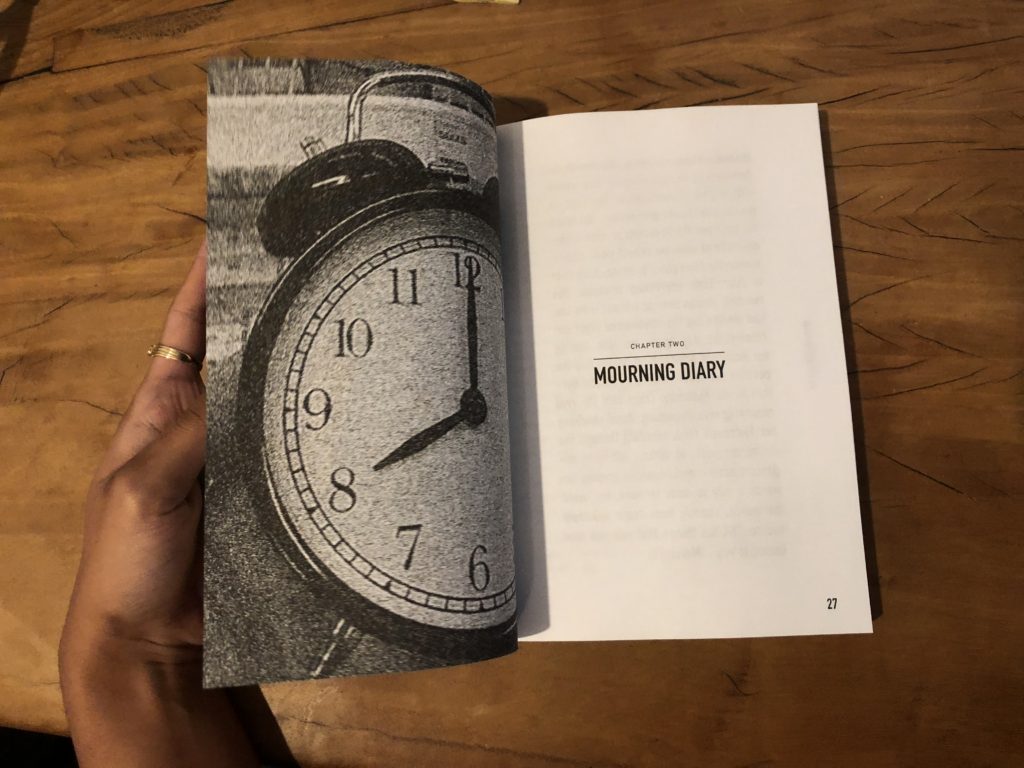
At the same time, there is something precarious about my idiosyncratic position triangulating Classics, Contemporary Art and Trump. (A precariousness marked by the fact that now I no longer write these words as a Classicist). Yet as I hope you will see, when you get your hands on the book, it is the seemingly tenuous juxtaposition of the historically valorized white-washing construct of ‘the Classical’ that has been bestowed on the ancient Mediterranean cultures of Greece and Rome with the relentless balancing act between novelty and prestige in Contemporary Art that find a counterpoint in our dangerous twittering gangster of a president (And yes, I know I am writing this on his birthday, but this is no gift!).
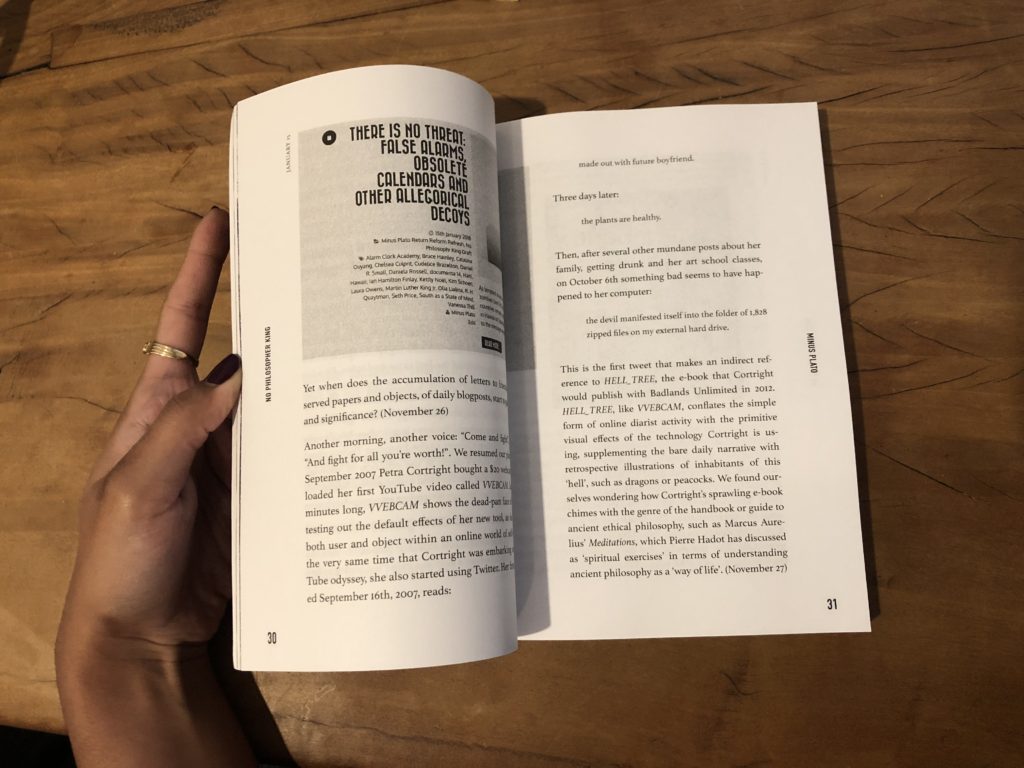
In turn, it is out of this heaviness and precariousness that No Philosopher King outlines a unique space for resistance. For sure, decolonial critique within the academic discipline of Classics and the institutions of Contemporary Art are set up to challenge the violent mansplaining and devious gaslighting promoted by the unquestioning, executive privileges of a whole range of sages and gatekeepers, ancient and modern.
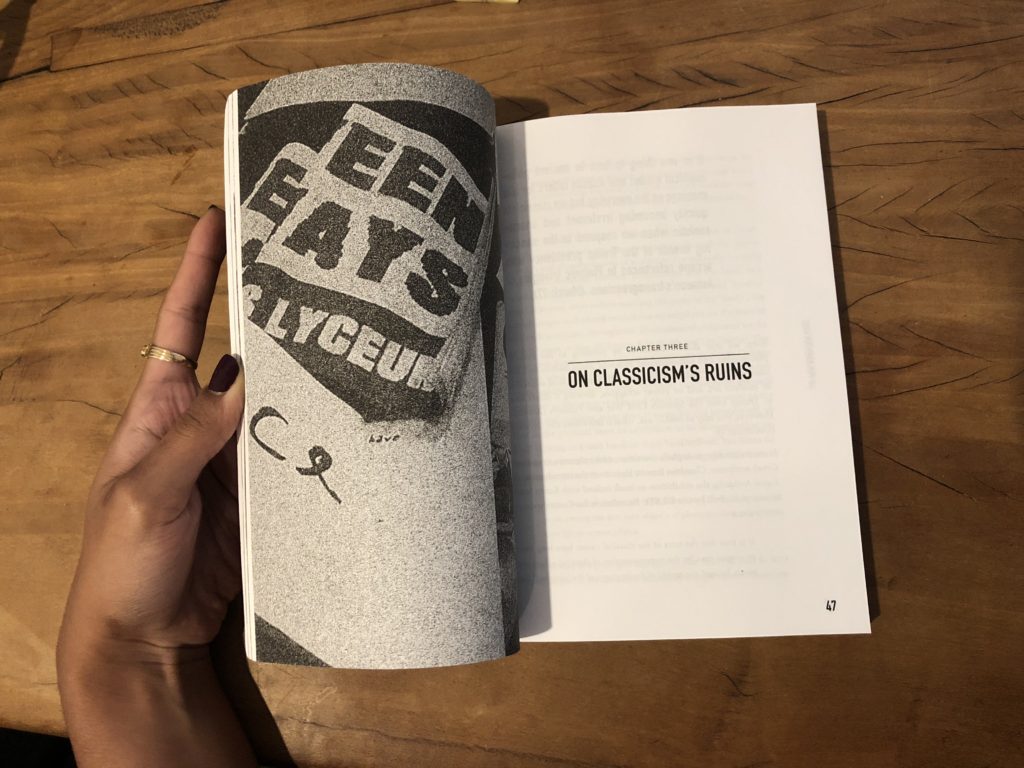
For a recent set of examples, see Seph Rodney’s article in Hyperallergic in which he takes reviewers of the current Whitney Biennial to task for “relegating white supremacy to the realm of academic ideas” and, at the same time, Mathura Umachandran, writing for the online Classics journal Eidolon, examines the place of race and class in academia to “observe how Classics is part and parcel of a society structured by overlapping and intersecting injustices”.
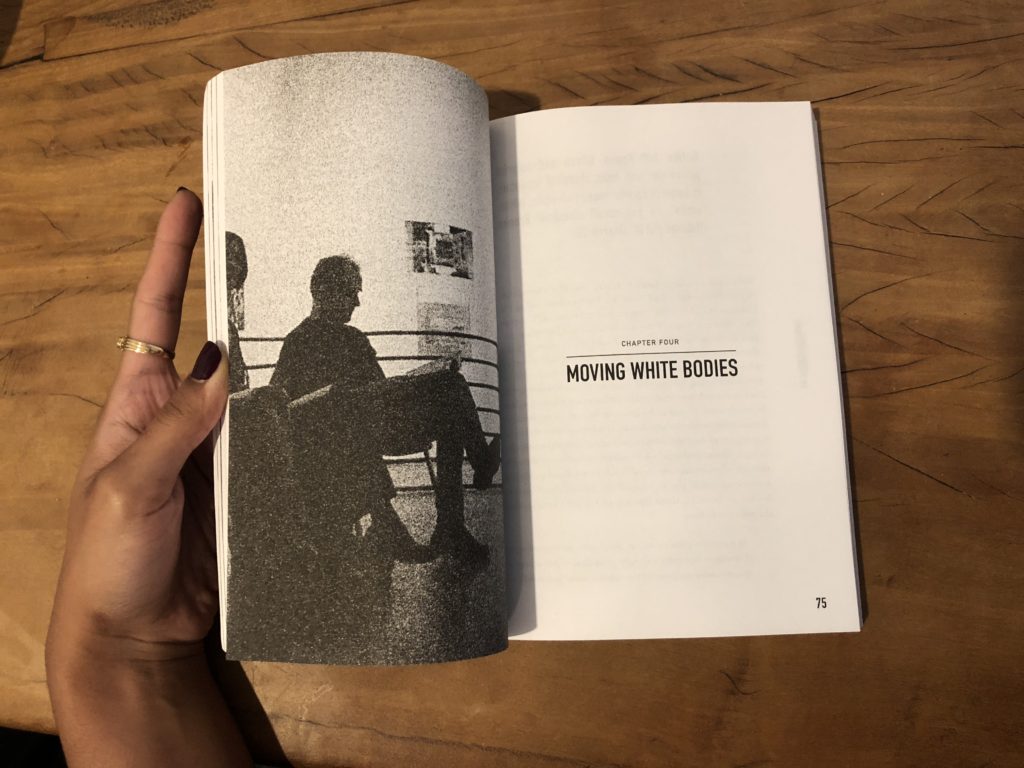
Yet where No Philosopher King differs from these vital and timely decolonial interventions is how it narrates a story from a space that is both at the intersection between the academic field of Classics and the institutions of Contemporary Art, but also somehow outside of them both.
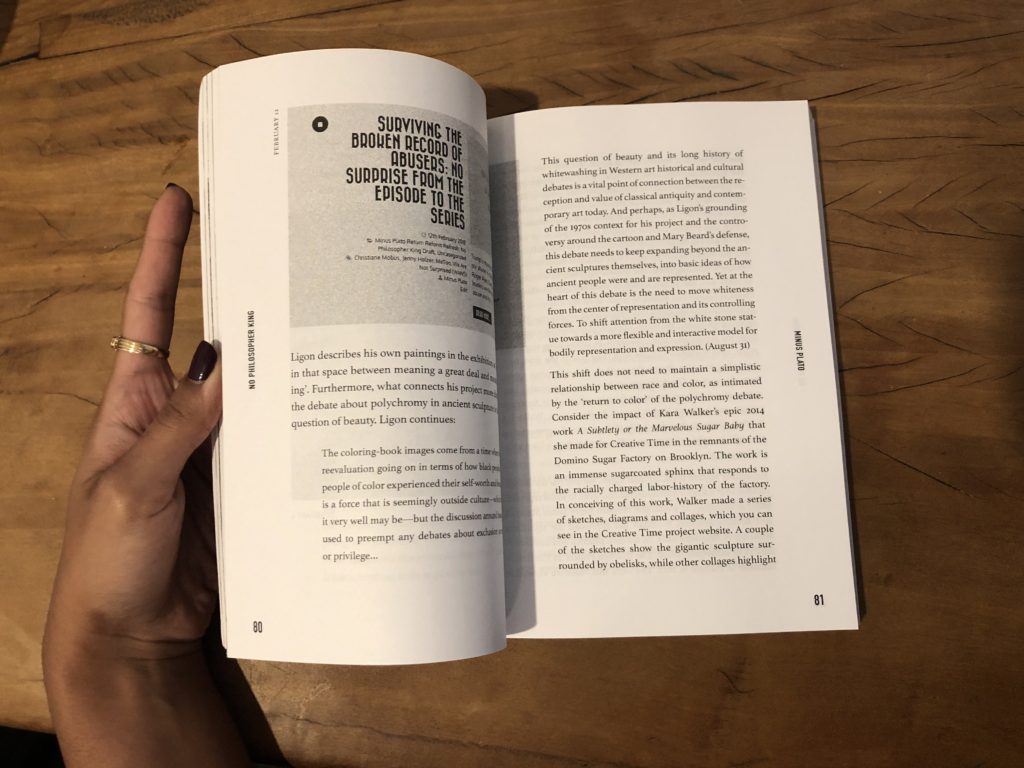
This book is my last project as a classicist and it may be read as a testament to the painful process of my leaving a discipline that I had loved and devoted over 20 years of my life to (from my undergraduate studies and PhD at Cambridge to my time as a tenured professor at Ohio State). What has happened since has been a difficult transition and process of unlearning, which at times has lead me to misuse Minus Plato as a platform to troll my former discipline, calling for Classics to be destroyed (#junkclassicsnow).
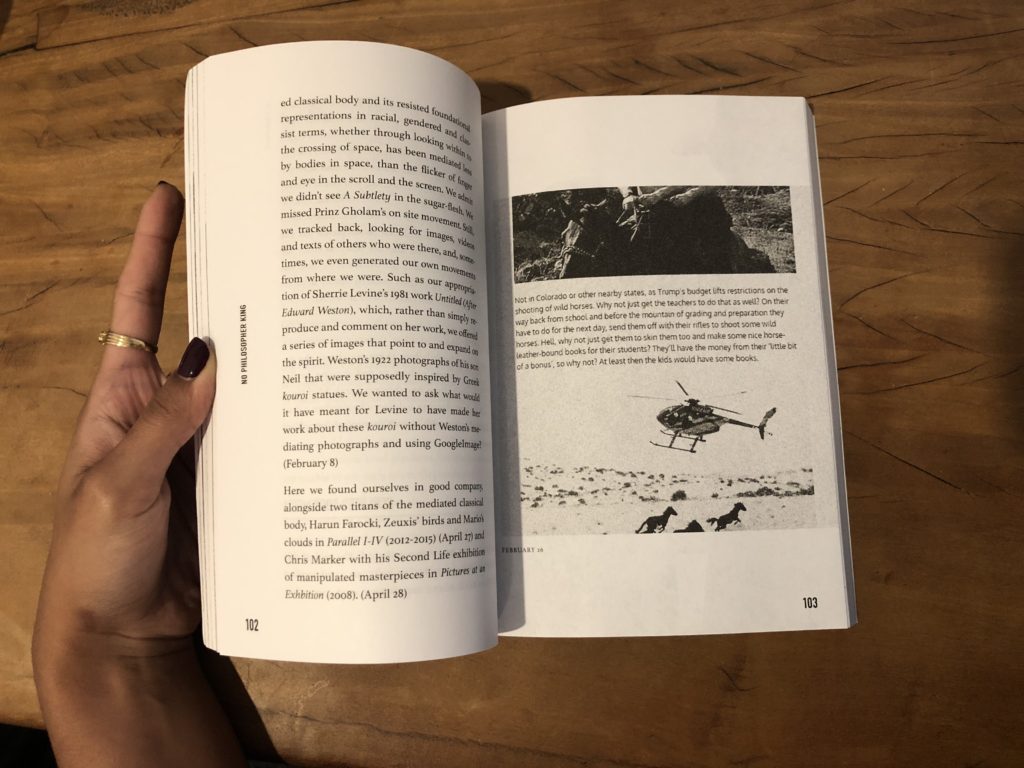
Yet now, on the occasion of this post to launch No Philosopher King, I
realize that the decolonization of an academic discipline like Classics demands a different strategy, one that speaks to the delicate balance between heaviness and precariousness I found with my book in my hands.
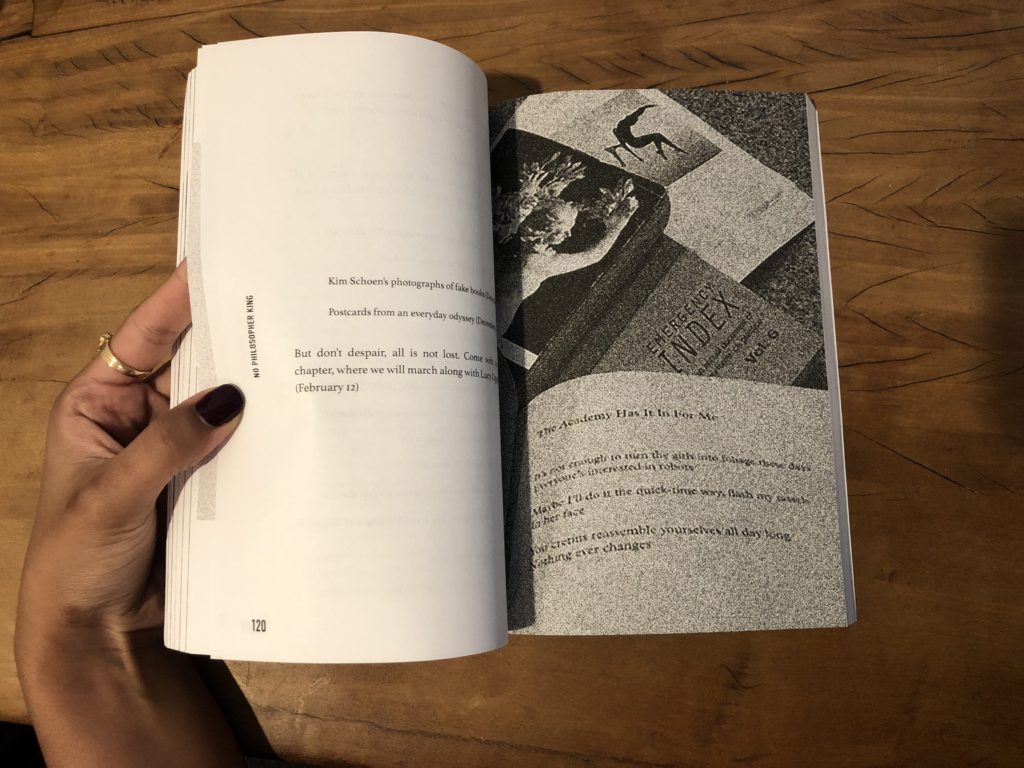
This is what documenta 14 taught me. The thematic coherence of the exhibition was not merely embodied nor exhausted by the works of the artists involved. If anything, the artists challenged the very contexts in which they were presented to the world, breaking down historical and thematic structures, to dialogue about what it means to live together now.
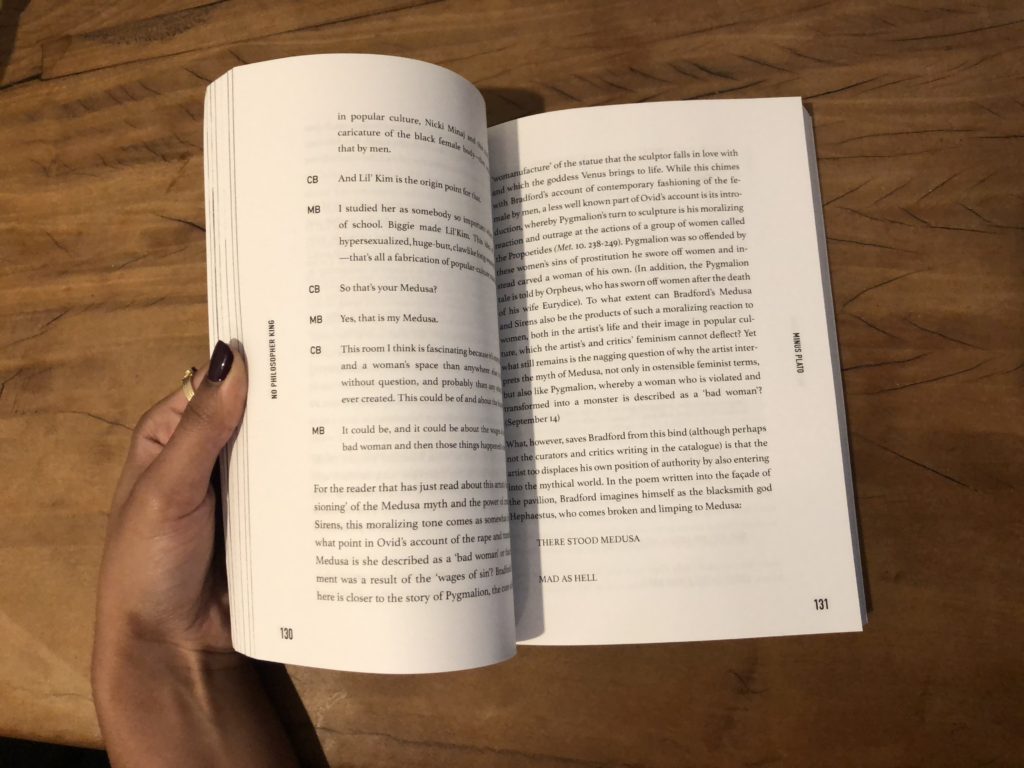
No Philosopher King follows documenta 14 in offering a model for the separation of the study of ancient Mediterranean cultures and their continued legacies in the modern world from the violence of their canonization and valuation of ‘Classics’ at the expense of other voices. documenta 14 was able to start this process with its working title of ‘Learning from Athens’ being less about the so-called ‘Greek miracle’ of the Classical Athenian ‘brand’ (cf. Johanna Hanink’s essential book The Classical Debt) than the pressing issues of debt, migration, nationalism and fascism.
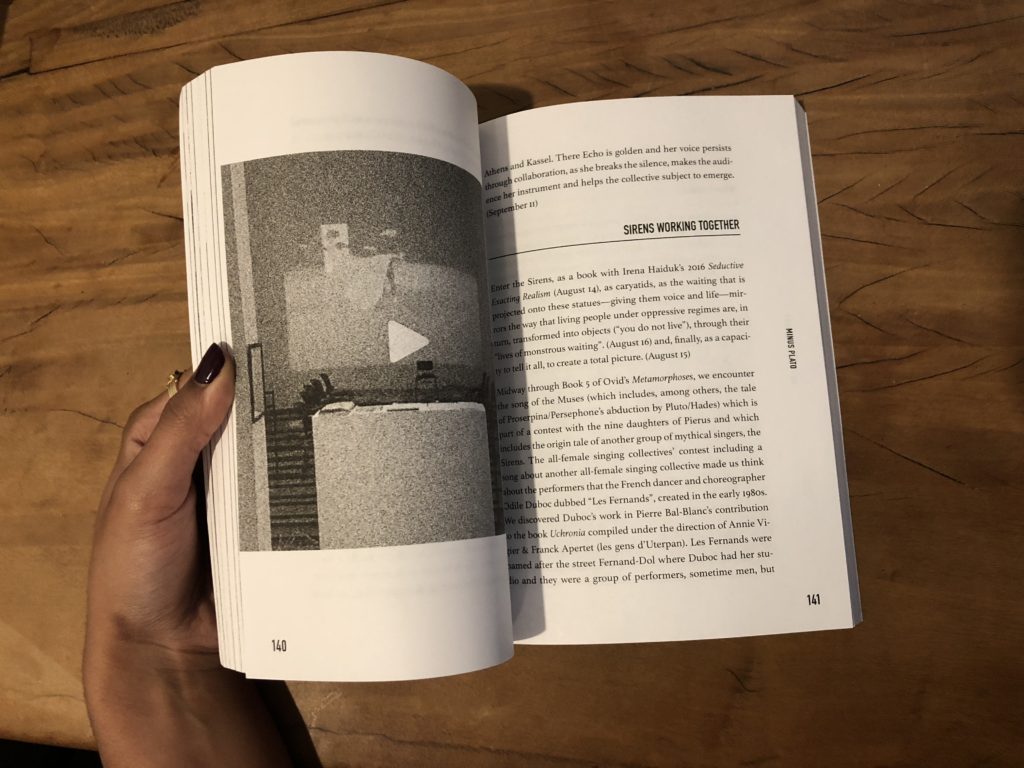
Where does this leave birthday boy Trump? Of course, we must resist his administration with its racist, xenophobic, misogynistic and transphobic policies and the clear eroding of our democracy under his watch. Yet to single this one man out as the only problem (and his removal via impeachment or at the ballot box as the sole solution) fails to see the deeper work that we need to do in this country (and around the world) to redress centuries of living within the colonial matrix of power and its intensification under a hyper form of disaster capitalism.
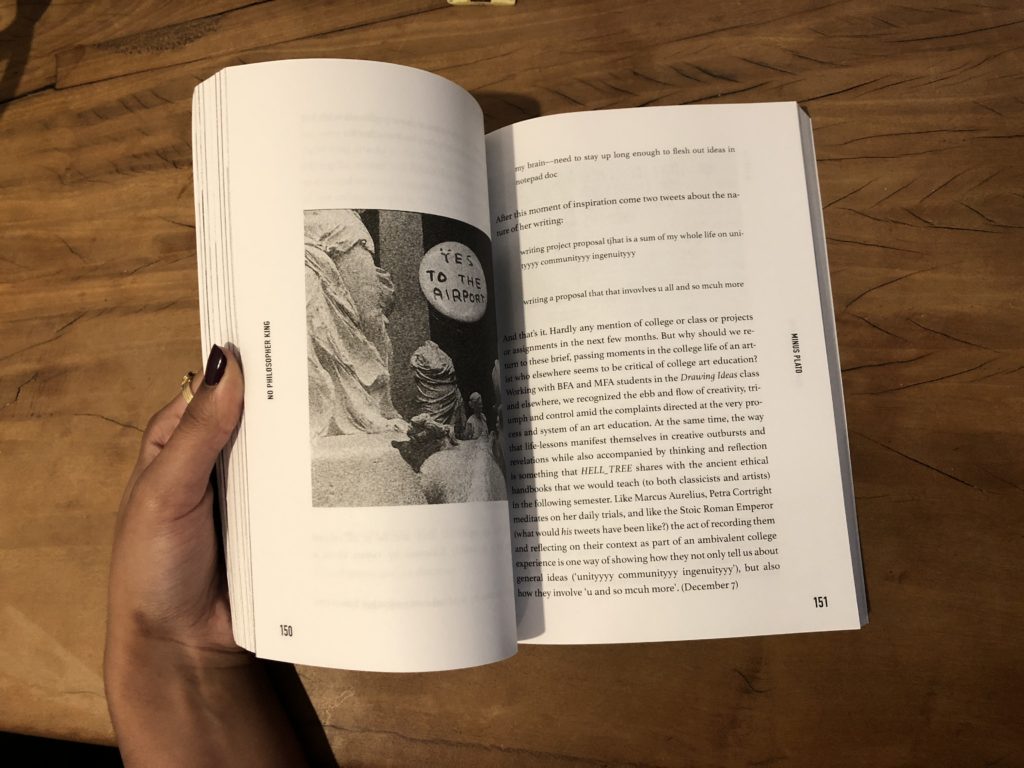
Sure, Trump is the mad king and his delusions prompt a turn to reason, but we must be careful for what we wish for. Perhaps soon, back in my old country, there could be no madder, more rational leader than Boris Johnson, precisely because of his Classical education! This is why we must oppose the philosopher king as much as the demagogue.
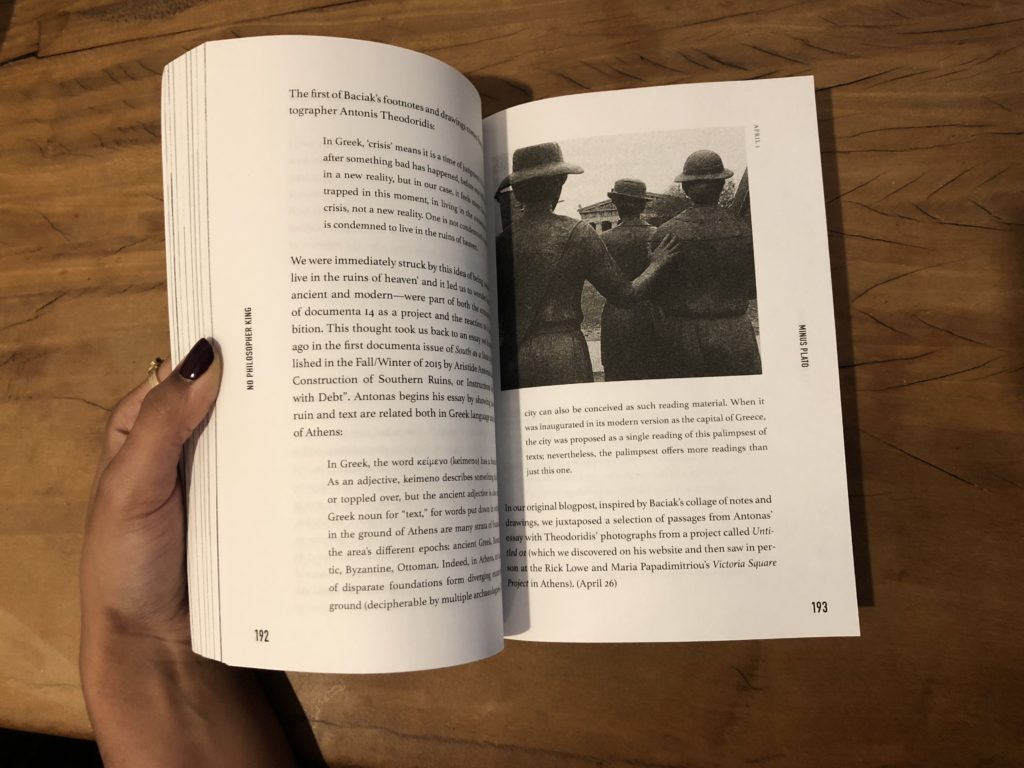
To turn from the exhausting daily burden of resisting Trump and look back with No Philosopher King to his first two years it is less important to prove how much things have worsened (and they definitely have!).
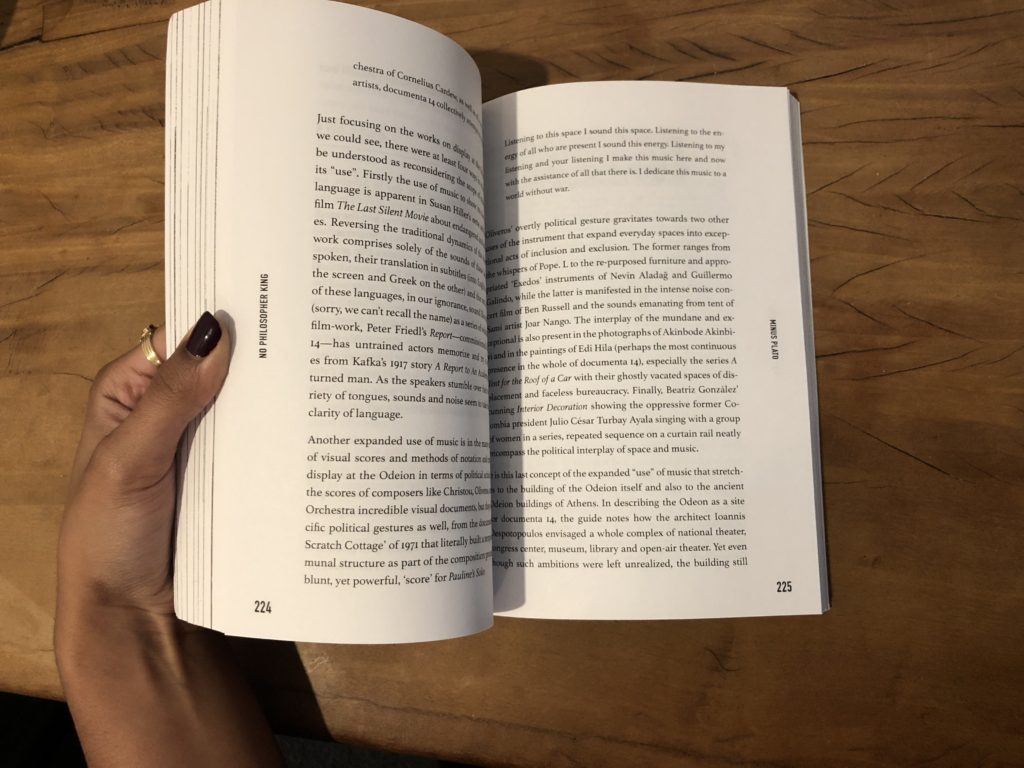
Instead, this book offers itself as a timely reminder for each of us, that it may be the tools we have at our disposal, those our flawed formations have given us and our specific positions and their narratives, that will be the ground from which a sustainable resistance will grow. You don’t need to be a classicist or an artist to find yourself within these pages and to use them as a guide to dismantle every one of our masters’ houses, whether erected by a Plato or a Trump.
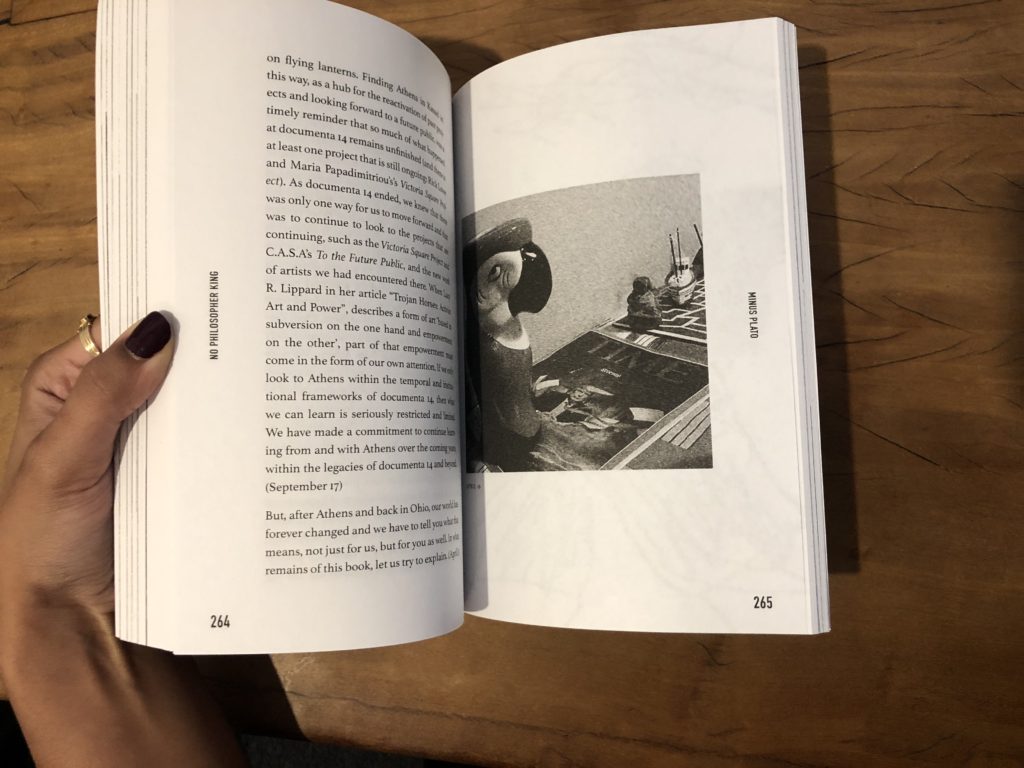
I will leave it to my next book (another book to come) to build more directly on my embodied experience as a visitor to documenta 14 as a means of outlining a decolonial curriculum for future art education (continuing the amazing work of the aneducation team).
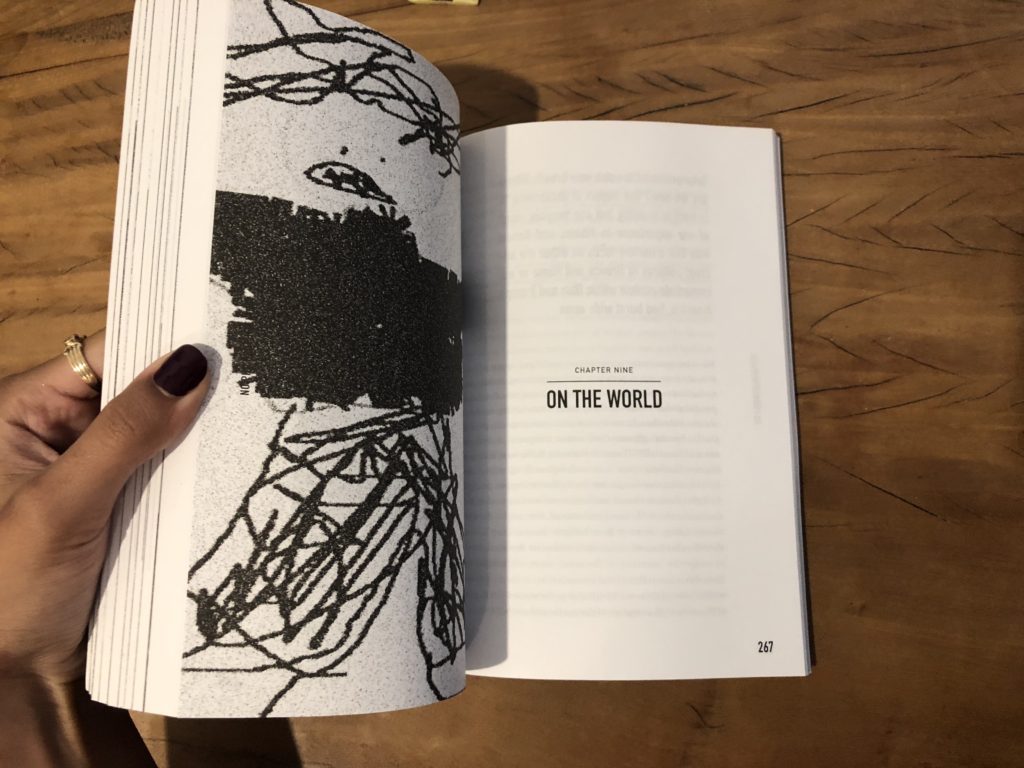
But for now, I give you No Philosopher King, in all its heavy, precarious glory.
